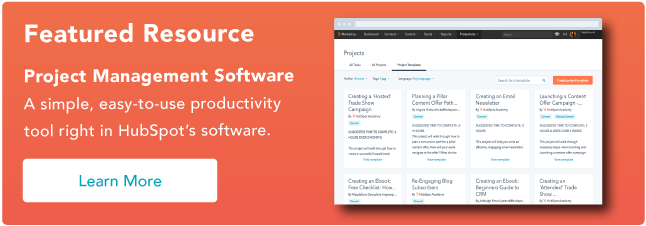Even the most creative people know the most innovative projects get done when you work as a team. However, working as a team can be difficult without the right tools to streamline and organize your workflows while keeping everyone informed.
So, to help you work more efficiently with your team, I rounded 10 of my favorite design collaboration software and tools you can try.
Let’s get into it!
What is design collaboration software?
Best Design Collaboration Tools That I Love
1. Asana
2. InVision
3. Figma
4. Typeform
5. Notion
6. Miro
7. Trello
8. Balsamiq
9. Simplified
10. Visme
With the right collaborative tools and software, you and your team can efficiently collaborate while monitoring projects, ensuring everyone is on the same page.
Now that you know about design collaboration software, let’s dive into different software and tools available to your organization.
And, once you’ve chosen which tool or software you want to use for your next collaborative design project, check out HubSpot’s Content Hub to help you with the creation side of your project.
You can explore our free web design resources for extra inspiration or help.
Best Design Collaboration Tools That I Love
Here are 10 creative collaboration tools I recommend checking out.
1. Asana
I’ve been using Asana for years, and it’s been incredibly helpful in managing my assignments and collaborating with colleagues at HubSpot.
It has a variety of features, such as intuitive work workflows, calendars, and task boards that you can either keep for yourself or loop your team on.
What I like:
Asana allows users to plan and structure their workflows to their liking. I especially love that I can set deadlines and communicate them to my team members via messages in the platform or automatic email notifications.
Asana also has a card feature that allows you to leave important details and checklists regarding how the assignment should be completed, almost like a virtual flashcard with the assignment on the front and information on the back.
Best for:
Asana is best for teams in which assignments are sent up the ladder to the next person. For example, someone may assign me a blog post in Asana.
Once I complete that blog post, I mark it as completed, and it’s pinged to my colleague for scheduling.
What Users Are Saying:
It‘s me; I’m “users.” I use Asana all the time for work, and I enjoy it. It‘s easy to create detailed cards with assigned tasks and track my and my teammates’ progress through our workflows.
2. InVision
InVision is like a digital whiteboard platform that allows teams to collaborate, share essential project details, and communicate at every step of the design process.
The last thing you want for a project is a fractured team in which some people are unaware of what’s happening.
Invision solves this issue by centralizing your project and enabling your team to collaborate in one place.
What I Like:
The platform provides a customizable experience with over 100 templates and allows your users to integrate their favorite tools. This creates a custom workflow that is adaptable to the user’s needs.
Best for:
InVision is best for marketers who want to centralize and manage every aspect of the design process, from ideation to hand-off.
What Users Are Saying:
Users say InVision is very intuitive and easy to use, but creating a prototype can be difficult because it might not always recognize links and buttons on your prototype.
3. Figma
Figma is an impressive all-in-one platform that boasts a variety of tools for different use cases ranging from brainstorming to strategic planning to prototyping and beyond.
Seriously, I was blown away by the resources and tools in Figma’s arsenal.
In addition to the plethora of services Figma offers, it also provides real-time collaboration features to streamline your workflow and centralize your team’s design project.
What I Like:
This platform is among the most versatile on this list and boasts features like:
- unlimited viewers (great for large teams)
- shareable links
- private projects
- Unlimited teams
- Custom workspaces
Moreover, Figma has a mobile app for Android and iOS, making it ideal for marketers who are constantly on the go.
Best for:
Figma is an excellent option for both individual and team projects. Thanks to its unlimited viewers and team features, it’s ideal for large or cross-functional teams.
What Users Are Saying:
While looking through reviews, I noticed a lot of users calling Figma the best UX/UI design tool, especially for new or non-designers.
4. Typeform
Sometimes, I need feedback from my teammates on a blog post pitch or a project idea. If you’re in the same boat, you can probably send a message in Slack, schedule a 1:1, or request feedback via email.
However, a survey would be more appropriate if your team is large or you need more comprehensive information.
Platforms like Typeform make it simple to create user-friendly survey forms that help you accumulate feedback in a timely fashion.
What I Like:
With Typeform, I can create quizzes, polls, or surveys so I can gather feedback from my team, such as what’s working or not working in my project or if teammates are encountering any hiccups.
I especially love that I can add images, GIFs, or other types of media to make my surveys more interesting and engaging.
Best for:
Creating surveys to send out to team members.
What Users Are Saying:
5. Notion
I have mentioned Notion in several other blog posts, and for good reason—I and other creators swear by it.
A while ago, I spoke with blogger, podcaster, and YouTuber Lisa De La Cruz about the productivity and note-taking platform, and she loves it.
“It’s a connected workspace with hundreds of free templates perfect for managing content creation, deadlines, finances, and more,” she said. “The content creation calendar is a game changer, making it easier to take an idea all the way to the finished product seamlessly.”
What I Like:
Notion is a wonderful platform for storing and organizing screenshots, links, and other media in a Wiki-style layout. This allows you and your team to keep track of references in one place.
You can also customize your Notion layout to accommodate your workflow.
Best for:
The platform is best for saving and organizing references for your team so they can easily be deferred back to when needed.
What Users Are Saying:
Most users praise Notion for its organizational resources. However, they say the mobile app isn’t as optimized as the desktop.
6. Miro
Miro is a whiteboard platform that can be most hopeful during a team design project‘s brainstorming and ideation phase.
Multiple people can edit the board at once, and teams can choose from a variety of templates, so they won’t have to spend time creating a layout they love from scratch.
What I Like:
Miro is very user-friendly and has an intuitive layout.
Best for:
Miro is best for brainstorming and collaboration among team members.
What Users Are Saying:
Users praise Miro as an exceptional collaboration tool, especially for global teams during brainstorming sessions.
7. Trello
Trello is a work management tool that works similarly to Asana. Like Asana, it includes workflow boards that you can organize to track your projects from start to hand-off.
What I Like:
I love tools like Trello because I’m a visual person. Seeing assignments neatly organized into boards that other team members can access and track helps me visualize my workflow.
Like Asana, tasks within workflow boards can be marked “Assigned,” “In Progress,” or “Done,” so team members are all aware of how a project is progressing.
Best for:
Trello works best for teams that use the Kanban approach to their workflow. Kanban means using visual cues to communicate the tasks that need to be done in a workflow.
What Users Are Saying:
Users love how simple Trello is to use since it mainly requires dragging and dropping digital cards from one stage to the next. The platform’s visual elements makes is easy for users to track their progress on just one screen.
However, some users complain that private items and personal notes can be difficult to distinguish from shared boards, meaning team members can wind up receiving notifications for personal tasks that don’t concern them—which can be distracting.
8. Balsamiq
This tool takes a fun approach to organization by utilizing a less aesthetically polished UI that mimics the experience of jotting down information on a notepad or whiteboard.
The low-fidelity approach encourages users to focus less on the visuals of a project and more on its structure and content.
What I Like:
I‘m a sucker for a unique motif, so I love Balsamiq’s “marker-on-a-whiteboard” look. Plus, it’s a great tool for beginner designers who simply need a quick mockup.
Best for:
Balsamiq is excellent for collaborating on design mockups.
What Users Are Saying:
Most user reviews of Balsamiq mention the platform’s “ease of implementation.”
9. Simplified
Simplified is a design software tool that boasts a plethora of collaboration tools as well as AI tools that streamline the design approval process.
What I Like:
Thanks to its intuitive interface, Simplified lives up to its name. Furthermore, it includes unlimited workspaces that allow users to collaborate with as many clients and stakeholders as they need.
Best for:
If you want a tool that will boost the efficiency and speed of the design approval process, them Simplified could be for you.
What Users Are Saying:
Reviews of Simplified show that users appreciate its free plan, which allows them to use a variety of features at no cost.
Many also say it’s helped them to create more content, such as blog posts, faster and to help them keep track of multiple client-based projects.
10. Visme
Visme is a cloud-based content creation tool that is designed to be intuitive enough for users without design experience.
Visme is especially useful for marketers, creatives, businesses, and educators looking to craft materials such as infographics, social media graphics, and presentations.
What I Like:
Visme allows for role-based permissions, meaning that users can designate different levels of access depending on the roles of team members.
This helps protect sensitive information and ensures some team members aren’t bogged down with details that may not be pertinent to their tasks.
Best for:
Visme is best for crafting visuals that bolster content.
What Users Are Saying:
Many users, like the one below, praise Visme for how easy it is to use and for its unique features, such as the background removal tool. Many found that it’s flexible for use on an individual and team level.
The right design collaboration tool can greatly affect how quickly and efficiently your team completes a creative project. So, make sure you weigh your options and pick the best one for your organization. Good luck!

















